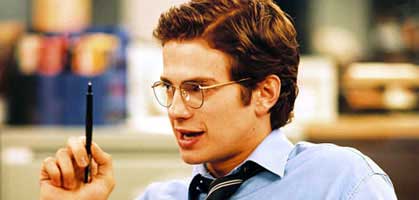
It didn't happen here
Film of the Month: Shattered Glass

Shattered Glass shows how a journalist's deceptions shook the reputation of a US magazine. But how can we tell truth from lies, asks Edward Lawrenson
Although set in the late 1990s, Shattered Glass proves a timely release. Based on a true story, the film charts the rise and fall of Stephen Glass (Hayden Christensen), a young staff writer on the influential Washington-based political magazine The New Republic whose glittering career was cut short following revelations that he fabricated many of his reports. If the film plays like a cautionary tale about rotten practices in the fourth estate, it's a lesson that has yet to be heeded by today's media. The New Republic may have tightened fact-checking procedures following the Glass affair (procedures that were already tough), but just a couple of months ago USA Today admitted that one of its reporters, Jack Kelley, made up substantial parts of eight stories, offering readers a lengthy apology in an attempt to avoid the damage to its reputation endured by The New York Times last year following the similar Jayson Blair controversy.
Yet there's nothing forced about Shattered Glass' contemporary relevance. Appropriately in a film that prizes accurate reporting, writer-director Billy Ray cleaves closely to events as they occurred (crediting as his source Buzz Bissinger's lengthy article about Stephen Glass, first published in a 1998 issue of Vanity Fair). For one thing, the evocation of late-1990s Washington is deftly accomplished. An especially nice detail in the opening moments sets the scene: a row of Monica Lewinsky-themed condoms fleetingly glimpsed as Glass attends a political convention, one of few overt references to the looming Clinton impeachment that rumbles in the background.
Ray's portrait of the behind-the-scenes work at The New Republic is similarly scrupulous. Much of the film is set in the magazine's Washington newsroom, a characterless, grey-looking office floor that seems to operate under its own ecosystem of striplights and air-conditioning. But against this anonymous backdrop Ray demonstrates a compelling fascination for the procedural detail of putting The New Republic together. Key here are the stringent fact-checking processes Glass' first editor Mike Kelly brought with him from The New Yorker. In what plays like a contemporary version of those hot-off-the-presses montages from the 1940s, Ray shows us the multiple stages copy must go through before it's finally published: offending phrases or unsubstantiated statements - filling the screen, on paper or on blinking VDUs - are unceremoniously scrubbed out as each piece is submitted to the scrutiny of two sets of editors, lawyers and the publisher.
Apart from exerting a quiet documentary pull, this attention to The New Republic's assiduous editorial practices highlights the scale of Glass' deception. Although Ray concentrates on only two stories Glass fabricated - a convention for computer hackers and a rowdy rally for young Republicans - the film ultimately reveals that some 27 of his 41 published pieces were false. You're left staggered, and not a little impressed, by the sheer effrontery of the 25-year-old journalist.
Wisely, Ray holds off from revealing the extent of Glass' dissembling until a good way into the film - we, the audience, as much as Kelly and subsequent editor Charles Lane, are taken in by the stories, mostly short eye-witness pieces (notes for which Glass fabricated to bamboozle the fact-checkers), and by the bashful charm he displays at editorial meetings. It's only when journalists from an online zine probe the integrity of the hackers piece - in the cold light of day, an improbable tale of a teenage geek hired as a security consultant by a big software firm - that Glass' fabrications finally unravel.
The crucial scene comes when Lane, troubled by doubts about his young journalist, drives with Glass to the supposed site of the hackers story and picks apart the veracity of the report. "That doesn't seem very credible to me," Lane remarks at one point - a reined-in, gruff-voiced Peter Sarsgaard, his steady detective work making him the Columbo of US political journalism. After which, Lane is silent, shooting Glass looks of brutal disapproval the more unbelievable his story becomes. It's a moment of charged dread for the young Glass: the realisation he's been rumbled hits him as inexorably as if he were the victim of a car crash experienced in slow motion. The results make for the most gripping mainstream US film about journalism since Alan J. Pakula's 1976 All the President's Men (the latter's crisp, unfussy visuals are emulated here by DoP Mandy Walker).
But instead of Pakula's crusading, heroic central duo of Woodward and Bernstein, Shattered Glass revolves around a flawed and deeply insecure young man (played with far more subtlety than Christensen has shown elsewhere). As he tells us in his opening voiceover, Glass views journalism as the "art of capturing behaviour", but his skills are used less in the practice of his craft, more in manipulating others to advance his career. Wearing conservative business jackets that seem a size too big for him and a tie whose loose knot bulges on his neck like an ungainly Adam's apple, Christensen brings out Glass' boyish vulnerability: he's emotionally needy - "Are you mad at me?" he asks Kelly when the editor queries an early story, effectively disarming further investigation - but also solicitous of others' needs, always ready with a well-chosen compliment.
The relatively young age of Glass and his colleagues lends The New Republic office an air of preppy ebullience. Staffed predominantly by low-paid interns fresh from college - intellectually sharp but naïve and eager to impress - it's a place where keen young journalists wander in and out of one another's offices swapping advice on copy as if they were still undergraduates discussing a term paper. As with the software firm featured in Douglas Coupland's novel Microserfs, the workplace has a campus-like vibe that engenders a fierce sense of collective belonging: an early scene sees the paternalistic Kelly win starry-eyed devotion from his young staff when he threatens to resign after his punctuation-obsessed publisher orders the journalists to circle every comma in the latest issue of the magazine - which they do, ranged around a table like a class of obedient kids. It's a world away from the editorial hothouses beloved of Hawks and Wilder, with their hardened hacks swapping cynical one-liners with ticker-tape rapidity, or the backstabbing world of magazine journalism depicted in Ted Heller's scabrous novel Slab Rat.
In this collegiate atmosphere Glass' people skills make him a popular figure. At a party early on in the movie he keeps a specially labelled bottle of Coke in the freezer for a colleague after she mentioned a year ago that this is how she likes her drink, a gesture at once endearing and creepy. The film is excellent on the way Glass uses such small acts of kindness to further his career, almost without knowing so himself - which is what makes him so sympathetic. As with many pathological liars, there's a narcissistic edge to his deception, and the film's title is in this sense wonderfully suggestive: Glass is someone whose self-image depends for its cohesion on the approval and praise of others. Indeed, the emotional investment he brings to his job gives what could have been a low-key white-collar drama the fevered intensity of a family melodrama, with Glass casting himself as Kelly's favoured son ("Thanks for backing me," he says when the veteran journalist decides not to probe an early story), or as a caring big brother to his colleague Caitlin (an effective cameo from Chloë Sevigny).
And when Glass is finally exposed and faces censure, he mounts his defence not through careful refutation of the evidence but through appeals to bonds that seem as intractable as blood ties. When Lane rumbles him, the young reporter tracks down the sacked Kelly. "It's my loyalty to you that [Lane] is punishing me for," he tells him.
What emerges is not just a shrewd analysis of journalistic ethics but also a resonant parable about attitudes to work and professional responsibility. If most Hollywood movies argue for a softening of the rigours of white-collar life (the reference point being the caring, emotionally responsive agenda that the eponymous sports agent pursues in Jerry Maguire), Shattered Glass' ambivalence about too much touchy-feely sentiment in the workplace is refreshing. At a time when employment practices are increasingly encroaching on private space, this film sounds a salutary note of caution about investing one's work with too much personal baggage. Indeed, if there's a hero to this film, it's the stiff, joyless and rather remote Lane (isolated at times from his staff, but the only character seen to have a happy family life).
The one misjudgement in tone is perhaps the final scene, in which Lane is supported by his admiring staff for uncovering Glass' deception, a disappointingly sentimental sequence in an otherwise cool and intelligent film. But even this scene is marked by ambivalence, with the applause Lane receives juxtaposed with the grateful reception Glass gets from a class of journalist students after lecturing them on the profession. The suggestion is that Lane's victory is as hollow as Glass' claims of success to the admiring students: Glass' malpractice, after all, happened under Lane's watch.
But the greatest irony of this involving film about the value of accurate reporting is that the adaptation process has necessarily led to certain liberties being taken with the truth. Quite aside from the fact that composite characters have been created to compress the timeframe into a 90-minute movie, restaging real events for the camera inevitably involves a degree of falsification and imaginative reconstruction. As the Glass scandal grips the magazine, a secretary says: "You know what could have prevented this... pictures," a deadpan comment on the famously text-heavy pages of The New Republic. But the camera can lie as effectively as it can confirm the veracity of a story. At first Glass' fictional reports, justly praised for their cinematic detail, are enacted for us as if they really happened, and it's only after Glass is exposed that we realise they were made up. So as the full range of Glass' lies is made clear, we begin to doubt the veracity of everything we've seen. Did a condom manufacturer really name a range of its goods after Monica Lewinsky? Or was that another of Glass' embellishments?
